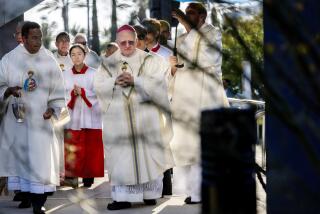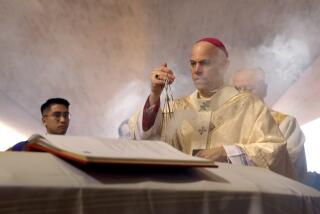Vatican Details Its Case Against Seattle Archbishop
- Share via
WASHINGTON — A groundswell of protest against the disciplining last month of Seattle Archbishop Raymond Hunthausen spurred the Vatican to fight back with the release of a detailed bill of particulars offering an unprecedented glimpse into the highly secret world of church politics at the highest level.
The four-page, single-spaced document, titled “A Chronology of Recent Events in the Archdiocese of Seattle,” for the first time spells out specific shortcomings the Vatican perceived in Hunthausen’s ministry. He is faulted for not following traditional doctrine in matters of liturgy, the marriage tribunal, training of future priests and use of former priests, moral issues in health-care institutions, and ministry to homosexuals.
The document will be the basis of a closed-door discussion of the Hunthausen case by the more than 300 U.S. bishops at their annual meeting here Nov. 10-13. Its release represents a rare public airing of the kind of controversy that is normally treated in strictest secrecy.
Hunthausen’s ‘Understanding’
Hunthausen issued a statement from his office in Seattle saying that “my understanding of a number of the statements, interpretations and conclusions” in the Vatican chronology “differ significantly.”
“I know about some of those events and exchanges because I was party to them; however, others I know of only by verbal report, hearsay or even personal surmise. I would even have to say that I learned of some of the judgments and conclusions only by reading the ‘chronology’ itself,” Hunthausen’s statement said.
But he declined, out of respect for the church and “loyalty to the Holy Father,” to comment further until a “more appropriate time.” He said he had been given “an indication” that he could make his case at the bishops’ executive session this month.
Hunthausen, 65, announced on Sept. 4 that he had been ordered to relinquish his responsibilities in the five areas in which questions were raised to a hand-picked, Vatican-trained assistant, Auxiliary Bishop Donald W. Wuerl.
The disclosure kindled protest among Catholics in Seattle and elsewhere who signed petitions and passed resolutions opposing the action.
The Vatican document identified five “problems” perceived in Hunthausen’s ministry:
- On divorce, it said he misunderstood and systematically misapplied “the so-called internal forum solution,” which permits divorced Catholics, under certain circumstances, to receive the sacraments even without a church annulment.
- On health care, it said Hunthausen failed to enforce church prohibitions “regarding contraceptive sterilizations in Catholic hospitals.”
- On homosexuals, it said he needed a ministry “unequivocally based” on church teachings that avoids “erroneous doctrines” and “affiliations with groups promoting doctrines contrary to the church’s teachings.”
- On liturgy, the document cited “repeated instances” of Hunthausen permitting non-Catholics to receive Communion at Catholic Masses, and Catholics to receive Communion at Protestant services.
- Hunthausen was also faulted for using inactive priests to teach and to say Mass, and for unspecified problems in admitting and training candidates for the priesthood.
Until his recent troubles with Rome, Hunthausen was best-known for his uncompromising opposition to nuclear weapons. He has regularly withheld part of his income taxes to protest spending for such weapons.
Denied Role of Pacifism
The document released Monday denied that his pacifist views influenced the Vatican action.
Hunthausen’s liberal views on social and doctrinal questions have made him a target of traditional Catholics, who have besieged the Vatican over the years with complaints about him.
The “chronology” document acknowledged “the high volume of complaints that were sent to Rome by priests, religious and faithful in the archdiocese.” But in investigating the complaints, the chronology said, “every effort was made to assess the credibility of the persons who had complained to the Holy See.”
The Vatican document charged that Hunthausen misrepresented the facts when he announced in September that Rome had required him to relinquish his authority to Wuerl in the five areas. What had been agreed to before Wuerl was appointed, the document said, was that Hunthausen would voluntarily--and without any public notice--turn over the responsibility to the auxiliary.
“At no time did the Holy See require Archbishop Hunthausen to make a public announcement that he had agreed to surrender any episcopal duties,” the statement said.
More to Read
Sign up for Essential California
The most important California stories and recommendations in your inbox every morning.
You may occasionally receive promotional content from the Los Angeles Times.













